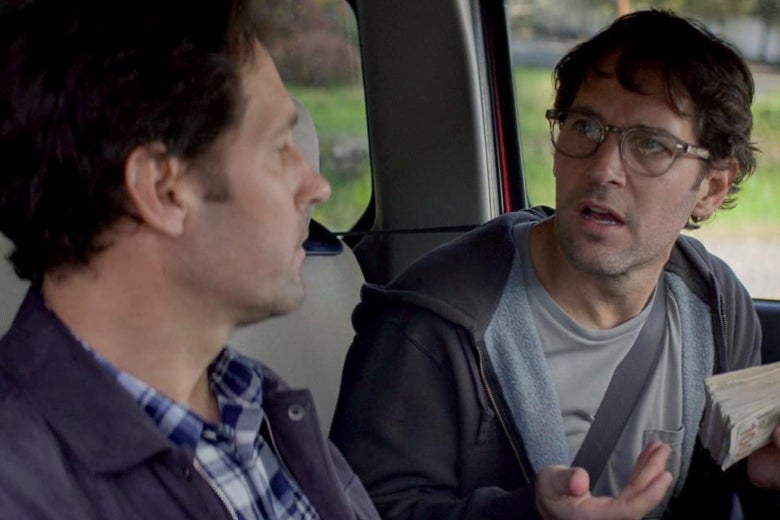
I finally finished Paul Rudd’s Living With Yourself on Netflix. It’s only 10 or so episodes that I started right when it came out, I’m
not much of a binge watcher though. I got hung up a month or so ago and sort of forgot
about it. The Crown came out for
season 3 so my TV priorities shifted. Since I'm caught up on the House of Windsor it's back to business.
Living With Yourself
makes assumptions about humans that ring true, we want shortcuts to happiness
and our humanity is tied to our unique experiences, good and bad.
Here is the story in a nutshell. It’s a spoiler alert
because I can’t explain the show without giving some of it away. Stop reading here if you plan to watch it. Miles is an ad
executive who is in a creative rut. His relationship with his wife Kate
(Aisling Bea) is shaky at best; they’re trying to get pregnant but Miles can’t
be bothered to show up at the fertility clinic. He is selfish and bored with
life until a coworker recommends a spa treatment to revitalize his situation.
The spa turns out to be a cloning racket where the ‘scientists’ create the
improved clone with less fat and better habits. The host is killed, or
supposed to be. It doesn’t take with Miles because of a screw up. He wakes up
in a plastic sack buried under ground and scrambles to tear out.
That opening sets the tone for the eerie story that follows.
Some of the scene music is creepy and foreboding with some lighter moments sprinkled here
and there. It feels a bit horror movie-ish at times. Not because of violence
but because of the unknown quality. Having a clone around and trying to keep it
a secret presents some frightening scenarios.
The rest of the series tries to answer the question of ‘how
will this arrangement work?’ Can the two men coexist? Will clone Miles murder
Miles? Will Miles murder his clone? Will the clone ruin everything by not
playing his part?
Another trick the
writers have introduced is to show the same scene from both Miles point of view
and the clone’s. This prevents us from favoring
one over the other and works to show distinctions when they’re important. This
isn’t an evil twin story despite their predicament. We see one side and then the other.
Are the writers telling us that we behave differently when motivations
are different? I don’t want to give too much away, but their approaches to life, as well as attitudes toward Kate are rooted in their
histories. The Miles clone has the same memories as Miles but only as images or
files that were transferred from another source. Miles carries the pain and
emotional attachment to his wife the human way, through his experience. Their
connection is physical and emotional and not easily replaced despite their
current marital problems.
Miles is not a great guy. He is selfish, he lies to
his wife and coworkers and scams local farmers. He is mopey and miserable at
home and despite his wife’s request that he go to the fertility clinic, he
ignores her. The Miles clone is a better version of himself, friendlier to
guests and more attentive to Kate. Miles gets jealous and tries to reclaim some
energy and initiative after a while.
I like the simple plot so far. Guy gets mixed up in a cloning accident
and has to figure out how to manage him, his clone and his relationship with
his wife, which is rocky. Rudd doesn’t oversell any of the parts, he plays both
characters straight. There is a running gag about Tom Brady at the cloning clinic that's pretty funny.
I think there are two lessons from this show. First, no
amount of shortcuts will ever lead to happiness and fulfillment. Second, humans
are more than just bone structure and DNA with memories. Clones might be copies,
but like a copy they are more of a picture than an exact replica. Cloning is
really just a fun story telling device. Michael Keaton’s Multiplicity used it as well but played the object lesson (that
shortcuts don’t exist) for laughs. ‘Living’ and Multiplicity both begin from the same point, stressed out people do
dumb things. Only Living With Yourself investigates the second lesson, that humans
are flawed creatures but completely unique in experience.
No comments:
Post a Comment